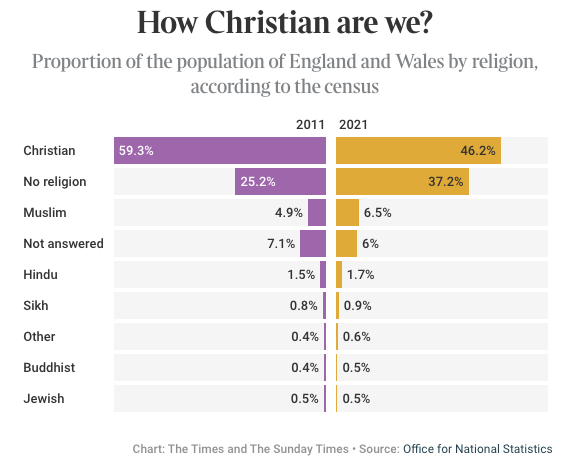The bells still ring out on Sunday morning, just as they have for hundreds of years, at the church nearest my house. It’s one of the few in London whose congregants still respond in their hundreds, filling the pews and the donation boxes, helping to host royal wedding or coronation fairs, handing out meals to the homeless.
I’m not Christian, and yet the church helps to structure the community I live in, building networks that I also inhabit, between parents in the playground and nearby nurseries and schools. It is faint, but it’s still there.
Across Britain, however, these sorts of networks are fading, like old root structures turning to mulch. A survey of Anglican clergy commissioned by The Times has found that almost two thirds of them believe this is no longer a Christian country. The last census, in 2021, showed a 13-percentage-point drop in those calling themselves Christians, to 46.2 per cent, and a 12-percentage-point rise, to 37.2 per cent, in those who declared they had “no religion”.
A certain strand of liberal opinion is liable to respond to this information with a self-satisfied “Good!”, like an adolescent unveiling a controversial opinion at the dinner table. Religion, they’ll contend, is nothing more than a force for conflict, ignorance and prejudice, and if the discussion continues, you are liable to get drawn into a not-particularly-illuminating narrative about how Europe’s devastating wars of religion were all about the length of a priest’s cassock and all sorts of other half-remembered, half-baked notions from GCSE history. Such is the long shadow cast by the John Lennon generation.
To say that religion has been involved in its share of abominations is a bit like saying human society has been responsible for heinous crimes. For as long as there have been societies, there have been religions; indeed, in most complex societies, religion has been a primary organising principle. And it is not as if post-religious societies, such as Maoist China or Soviet Russia, have particularly covered themselves in glory. The common factor for evil and exploitation is not religion, but humanity.
So allow me to feel saddened by the inexorable secularisation of this country. It seems to me that Britain could do with a bit more Christianity, rather than less, and that where the church withers away, it leaves a gap. The gap is mostly in the everyday habits and structures of life. There are almost no places left, like a church, where a community gathers regularly on the basis of its geographical proximity. This leads inevitably to a diminishing stock of neighbourly contacts and relationships.
There is no appointed time when a neighbourhood gathers to rest and reflect. There is no shared stock of wisdom to turn to during physical or moral trials, only the Google search box waiting for your plaintive question, with its drop-down menu of suggested phrases.
I once signed up to an app called Nextdoor, which purports to build local communities by connecting people who live near one another and have similar needs or interests. The whole thing was awash with carping and complaints about “people who leave their dogs alone barking all day”, “noisy children leaving rubbish everywhere” or fights about the Tories, Labour and Brexit. These forums seem universally to give vent to the vilest and pettiest of village instincts, without providing any of the human contact and local culture that foster pride and community.
Read it all in The Times










